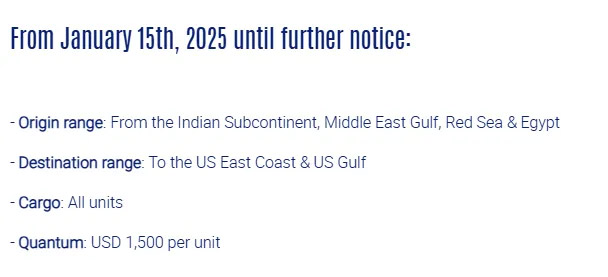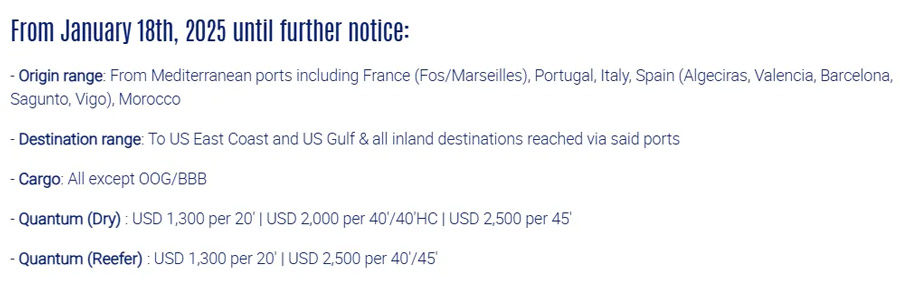

CMA CGM charges a peak season surcharge on routes from these regions to the East
Cma CGM has announced the introduction of a Peak season surcharge (PSS) for shipments from certain parts of the world to the U.S. East.
From January 15, 2025, CMA CGM plans to charge PSS of $1,500 per TEU for all shipments from the Indian subcontinent, Middle East Gulf, Red Sea and Egypt to the US East Coast and Gulf of Mexico.
The specific charges are: $1,300 /TEU for dry container cargo, $2,000 /FEU, $2,500 per 45-foot container; Cold container cargo charge: $1,300 /TEU, $2,500 /FEU, $2,500 per 45 foot container.
At the same time, the star also announced that it will impose a Strike Surcharge on all cargo entering and leaving the US East Coast and Gulf of Mexico terminals, effective January 10, 2025 (arrival date), charging a standard of $1,000 /TEU and $2,000 /FEU.
In addition, Maersk recently said that given the current negotiation situation, the company strongly recommends that customers pick up heavy containers and return empty containers at terminals on the US East Coast and Gulf of Mexico by January 15, 2025. Maersk explained that this measure will help reduce the impact of the risk of strikes at the terminal. It also stressed that contingency planning was being actively developed.
In the end, USMX backed down and reached a preliminary agreement on ILA members' salaries, which will increase by 61.5 percent over six years, while extending the main contract until Jan. 15, 2025. However, on sensitive issues such as terminal automation, no decision was taken at that time.
After that, the two sides held several talks, but did not reach a consensus on the issue of terminal automation, and the ILA even said that "negotiations broke down." The ILA stressed that the union would continue to work for "a fair contract" and that a strike was a last resort.
According to the latest information, the ILA and USMX have resumed negotiations on January 7, 2025.
From January 15, 2025, CMA CGM plans to charge PSS of $1,500 per TEU for all shipments from the Indian subcontinent, Middle East Gulf, Red Sea and Egypt to the US East Coast and Gulf of Mexico.

The specific charges are: $1,300 /TEU for dry container cargo, $2,000 /FEU, $2,500 per 45-foot container; Cold container cargo charge: $1,300 /TEU, $2,500 /FEU, $2,500 per 45 foot container.

At the same time, the star also announced that it will impose a Strike Surcharge on all cargo entering and leaving the US East Coast and Gulf of Mexico terminals, effective January 10, 2025 (arrival date), charging a standard of $1,000 /TEU and $2,000 /FEU.
In addition, Maersk recently said that given the current negotiation situation, the company strongly recommends that customers pick up heavy containers and return empty containers at terminals on the US East Coast and Gulf of Mexico by January 15, 2025. Maersk explained that this measure will help reduce the impact of the risk of strikes at the terminal. It also stressed that contingency planning was being actively developed.

In the end, USMX backed down and reached a preliminary agreement on ILA members' salaries, which will increase by 61.5 percent over six years, while extending the main contract until Jan. 15, 2025. However, on sensitive issues such as terminal automation, no decision was taken at that time.
After that, the two sides held several talks, but did not reach a consensus on the issue of terminal automation, and the ILA even said that "negotiations broke down." The ILA stressed that the union would continue to work for "a fair contract" and that a strike was a last resort.
According to the latest information, the ILA and USMX have resumed negotiations on January 7, 2025.





